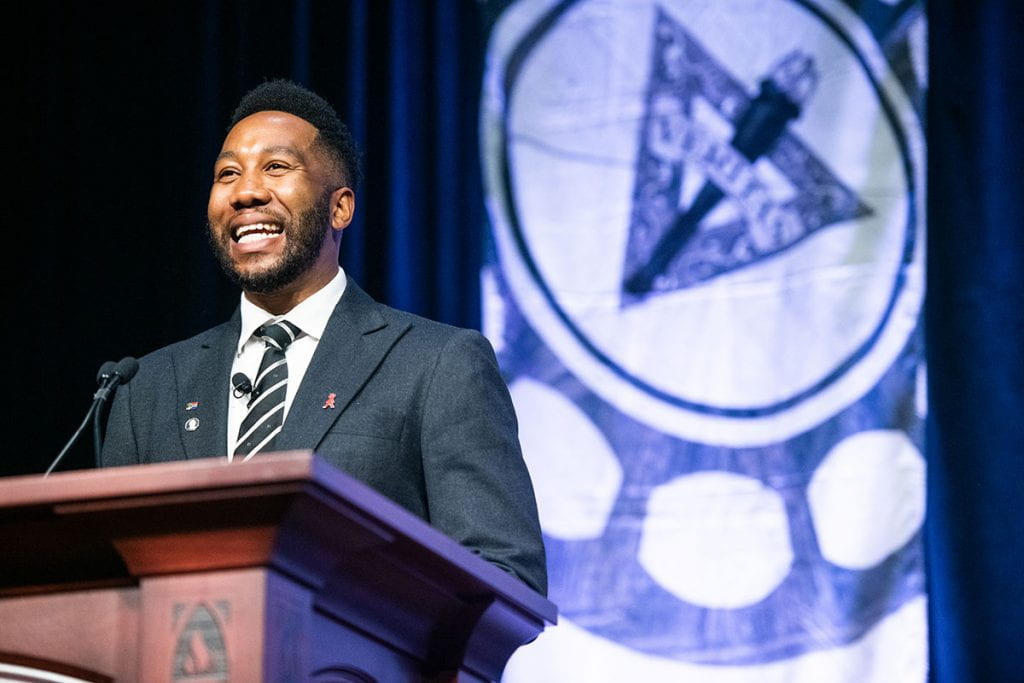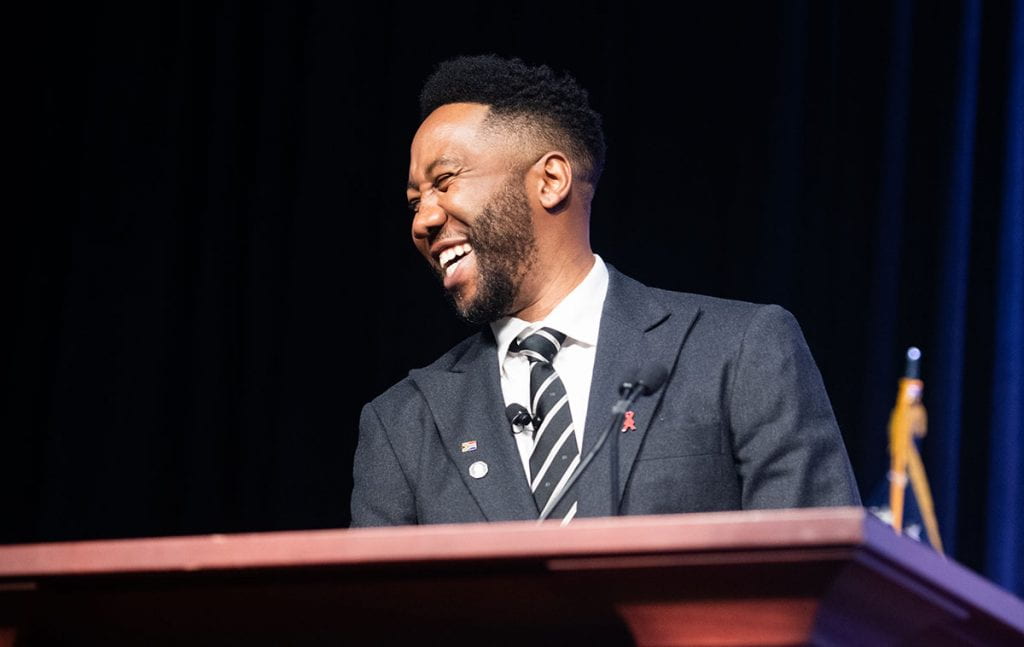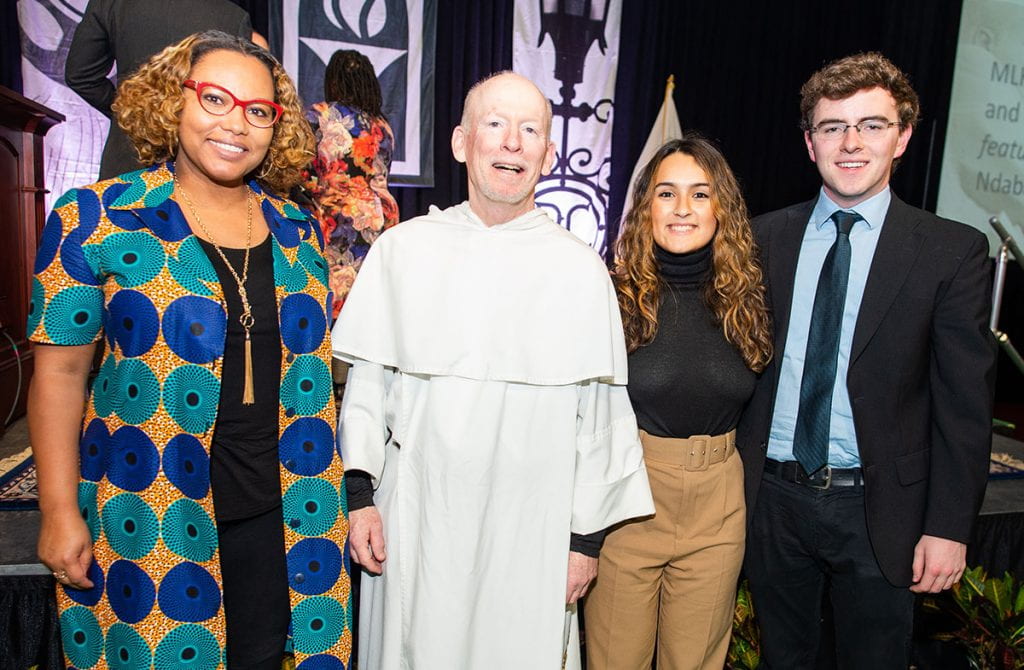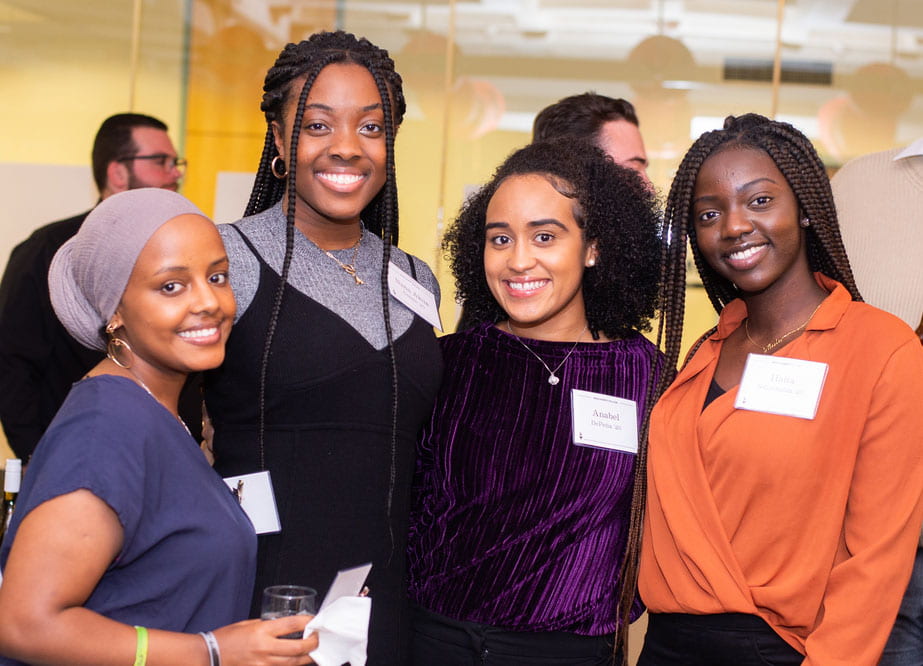At MLK Convocation, Ndaba Mandela encourages young people to ‘dream and dream big’
By Vicki-Ann Downing
Ndaba Mandela, grandson of South African civil rights leader Nelson Mandela and founder of the Africa Rising Foundation, urged students at the annual Rev. Dr. Martin Luther King Jr. Convocation at Providence College to work for the change they wish to see in the world and to not become discouraged.
Despite the message conveyed by the media, we live in a time of abundance, a decade that could be called “Twenty Plenty,” Mandela told students, faculty, staff, and alumni in Peterson Recreation Center.
“I am trying to encourage young people to dream and to dream big,” Mandela said. “If your dreams do not scare you, you are not dreaming big enough. It is important that we encourage our young people to dream and that we give them the necessary tools and resources.”
The convocation concluded a weeklong celebration of the life and legacy of Dr. King. The College’s first MLK Convocation in 2018 featured keynote speaker Dr. Bernice A. King, Dr. King’s daughter. In 2019, the College welcomed Rev. Nontombi Naomi Tutu, daughter of South African anti-apartheid leader and Archbishop Desmond Tutu.

Ndaba Mandela is the author of Going to the Mountain: Life Lessons from My Grandfather, Nelson Mandela (Hachette Books, 2018). He was born in apartheid South Africa in 1982 and met his grandfather for the first time in 1990, when he was 8 years old. Nelson Mandela had been released from prison on Robben Island and was being held at a private villa. Two months after the visit, he was set free. He was elected president of South Africa and served from 1994-1999.
When Ndaba visited America and London in 2001 with his brothers, he realized that outsiders knew little about Africa.
“I started to realize that people outside the continent of Africa have very little knowledge of Africa,” Mandela said. “The little information they have is what is perpetuated by the media — that Africa is a place of war, poverty, disease, and dictators, and the only positive thing is to go on a safari. Seeing the animals — not the people, but the wild animals. And I realized that we had to do something to change this misconception.”
In 2010, Mandela founded Africa Rising, an organization dedicated to empowering young people to be at the forefront of Africa’s development. To mark the organization’s 10-year anniversary, the Mandela Institute for Humanity was established to teach young people about the leadership style and values of Mr. Mandela, including humility, discipline, resilience, and passion.
Since 2009, Ndaba Mandela has served as a global ambassador for UNAIDS, an agency that works to end the HIV/AIDS epidemic using the international appeal of soccer. The “Zero Discrimination” campaign encourages people not to let HIV/AIDS “score a goal” against them. The organization’s goal is zero discrimination against those affected by HIV/AIDS, zero new infections, and zero deaths by 2023, Mandela said.
“Everybody in our country has been infected or affected by HIV/AIDS,” Mandela said. “I myself have been affected.”
HIV/AIDS caused the death of his mother, Zondi, in 2003, and his father, Makgatho, in 2005. When Makgatho died, the family met to decide “what to tell the world about how my father had died,” Mandela said.
Nelson Mandela announced that the family would tell the truth.
“We went out there in the garden and we all stood behind my grandfather and he read his statement,” Mandela said. “Now you must understand that in 2005, many families were still suffering from the stigma of HIV/AIDS, not able to disclose to their loved ones that they had been infected. People were dying in silence. My grandfather was trying to tell people that this is a disease like any other disease.”
Because of the HIV/AIDS epidemic, South Africa has a whole generation of households headed by children — 13-year-olds raising younger brothers and sisters, Mandela said.
“What kind of job is a 13-year-old going to look for to look after her 9-year-old brother, to look after a 5-year-old?” Mandela asked. “It’s going to be an illegal job. These are the kinds of things that perpetuate the social ills of our society — trafficking, prostitution — all these things caused by an epidemic known as HIV/AIDS.”

Ndaba Mandela quoted Dr. King’s widow, Coretta Scott King, who said that freedom must be won in each generation.
“Our grandparents fought the good fight, a physical battle of slavery, of apartheid, of segregation,” Mandela said. “They were able to break those physical chains. Now it is our turn to be in that seat, to see what isms, what schisms, still exist today. Our fight is a lot more difficult because our grandparents could tell what the enemy is. Today the enemy is no longer out there. The enemy lies within ourselves.
“I don’t want my kids to fight HIV/AIDS,” Mandela said. “I don’t want my kids to fight prejudice. I want my kids to find a new thing to fight, whatever it may be.”
In a discussion after the address, Dr. Kendra Brewster, assistant professor of public and community service studies, asked Mandela what he thought Rev. King and Nelson Mandela would identify as problems today.
Mandela said they would talk about the poor quality of leadership and why young people do not participate in the structures of society.
“Young people are marginalized,” Mandela said. “They don’t have a voice anymore. Who is the voice of the youth in America? That is one of the critical issues we’re facing. Young people are the best people who can represent themselves and what they want for themselves.”
Katherine Martinez ’20 (Stamford, Conn.) asked Mandela how students could keep from becoming discouraged when older people do not listen to them.
History is a great teacher, Mandela said. Dr. King and the civil rights workers faced challenges that felt insurmountable but kept trudging on. Nelson Mandela once said that when you reach the top of a hill, you are able to see how many more hills there are to climb. But God will give you the strength to fight, Mandela said.
“Do not be discouraged,” Mandela said. “You are the ones who make the change.”

As part of the MLK Convocation, MLK Vision Awards were presented to two individuals and a student organization exemplifying the teachings and spirit of Dr. King:
• Dr. Terza Lima-Neves ’00, associate professor of political science at Johnson C. Smith University in Charlotte, N.C., who studied political science at PC through a Rev. Dr. Martin Luther King, Jr. Scholarship. She is co-founder of the Poderoza Conference, the first international conference on Cabo-Verdean women in the United States.
• John “Jack” Murphy ’20, a double major in social work and Spanish, who has been involved in service since his arrival at PC. He was awarded a Father Philip A. Smith, O.P. Fellowship for Study and Service Abroad to spend the summer of 2018 in Rivas, Nicaragua, with the Dominican Friars, teaching English and environmental awareness. Last summer, he received a Veritas grant to intern with Progeso Latino in Central Falls, R.I.
• The Organization of Latin American Students, OLAS, a campus-based student organization that has sponsored events to create a more inclusive culture on campus. The award was accepted by the organization’s president, Laura Arango ’20 (Jamestown, R.I.), on behalf of the board: Alberto Nin ’21 (Bronx, N.Y.), Luis Urena ’21 (New London, Conn.), Valerie Antonio ’21 (Providence, R.I.), Juan Velez ’21 (Stamford, Conn.), and Mateo Godoy ’21 (North Providence, R.I.)

Reflecting Forward, a weekend of educational and social programming to celebrate the diversity of the College community, followed the MLK Convocation.
The weekend included a dinner; presentations on issues of diversity, equality, and inclusion efforts at the College; and alumni receptions for members of the Board of Multicultural Student Affairs and SHEPARD, Stopping Homophobia, Eliminating Prejudice, and Restoring Dignity.
College President Rev. Brian J. Shanley, O.P. ’80 and the event chairs, trustees Duane Bouligny ’94, Andre Owens ’85, and Monica Womack ’91, welcomed participants on Saturday morning before a presentation, “Our Commitment: A Diverse, Equitable, and Inclusive Community.” The presentation was led by Jacqueline Peterson, special adviser to the president and consultant on diversity; Dr. Shan Muhktar, assistant vice president and director of the Center at Moore Hall; and Nicholas Sailor ’17, director of training and education for diversity, equity, and inclusion.
Break-out sessions followed in the Center at Moore Hall. At “The Color of Excellence,” Magali García-Pletsch ’13, Sean Holley ’84, and Lima-Nevez shared stories of resilience and success. During “Teaching for Inclusivity,” Dr. Comfort M. Ateh, associate professor of education, and Dr. Lynne M. Lawson, assistant professor of physics, shared research and strategies used to encourage engagement and success in the classroom. The “Building a Safe and Welcoming Environment” session was moderated by Cate Latz ’13 & ’17G with panelists Ricardo Guzman ’20 (New York, N.Y.), president of SHEPARD, and two members of the student organization, Jolssen Rodriguez ’21 (Peabody, Mass.), and Lucy Gonzalez ’22 (Lynn, Mass).
During the dinner celebration, Mabelle Abreu-Sanchez ’14, Eva Irby-Davis ’75, Earl Smith, Jr. ’92, and Michelle Trieu ’14 shared heartfelt stories about what their PC experience means to them today. Reflecting Forward concluded on Sunday with members of the campus and alumni communities participating in interfaith spiritual reflections and Gospel brunch.





